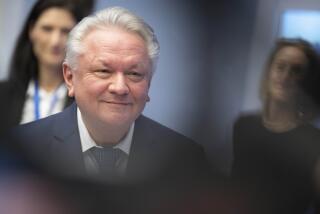Allies Discuss Curbing Technology Exports
WASHINGTON — Talks among major Western industrial powers Friday at a secret location in Bonn yielded “measured progress” on steps to block exports of militarily useful technology to Iran, North Korea, Libya and other renegade states, U.S. officials said.
The talks are the product of a quiet, yearlong effort to prevent a repeat of the Iraq crisis, in which a small country converted acquired technology into major arms capabilities. Until Friday, the discussions were shrouded in secrecy, right down to the name of the host country, because of the topic’s sensitivity.
Both U.S. and German officials refused to divulge the specific nature of the progress. Bush Administration sources cautioned that the effort is in the early stages and that it could take months, or longer, to reach full agreement.
In the past, U.S. allies in the Group of Seven industrialized countries--Britain, Germany, France, Italy, Canada and Japan--have not seen eye to eye on limiting exports of so-called dual-use technology. Similar U.S.-led efforts to develop a common policy on dual-use exports to the Soviet Union during the Cold War largely failed.
Dual-use can apply to such goods as pesticides that could be converted into precursors for chemical weapons, flatbed trucks that could be used as mobile missile launchers and computers used for a wide range of military activities.
Washington has been particularly concerned about dual-use sales to Iran, which is in the midst of a major effort to rebuild its military forces and arsenal after losing up to 40% of its weapons during the eight-year war with Iraq.
Most of Tehran’s purchases are from Russia and East European states. But because Germany and Japan are now two of Iran’s biggest trading partners, Washington is concerned that the Islamic republic may try to acquire technology from the West.
In the past, private German companies contributed to the proliferation of chemical-weapons development programs in both Iraq and Libya and to Baghdad’s budding nuclear program. And Japan has never had the antipathy toward Tehran experienced in the West.
Last week, Japanese Foreign Minister Michio Watanabe indicated reluctance to comply with the U.S. initiative. “We cannot agree 100% with the United States because our ties go a long way back and are different from Iran-United States relations,” he said.
U.S. officials hope the initiative is the beginning of a broader campaign in the 1990s, much like the U.S.-led counterterrorism effort was in the 1980s, to raise awareness and coordination among the allies on dual-use technology.
But an Administration source said the United States still needs to detail further the items subject to export controls. “In one sense, we’re overreaching,” he said. “We need to decide what specific equipment we want to stop, rather than ask for a ban across the board.
“Limiting the sale of a bolt or a coolant that can be used either for a refrigerator or for a tank is drawing the line too finely,” he said.
The U.S. delegation to the talks is led by Ambassador Paul Cleveland.
Germany hosted the secret summit because it is the current G-7 chairman. A German Foreign Ministry official said he would not discuss the session because “it was agreed that this meeting would be confidential and we are holding to those ground rules.”
Times staff writer Tyler Marshall in Bonn contributed to this report.
More to Read
Sign up for Essential California
The most important California stories and recommendations in your inbox every morning.
You may occasionally receive promotional content from the Los Angeles Times.










